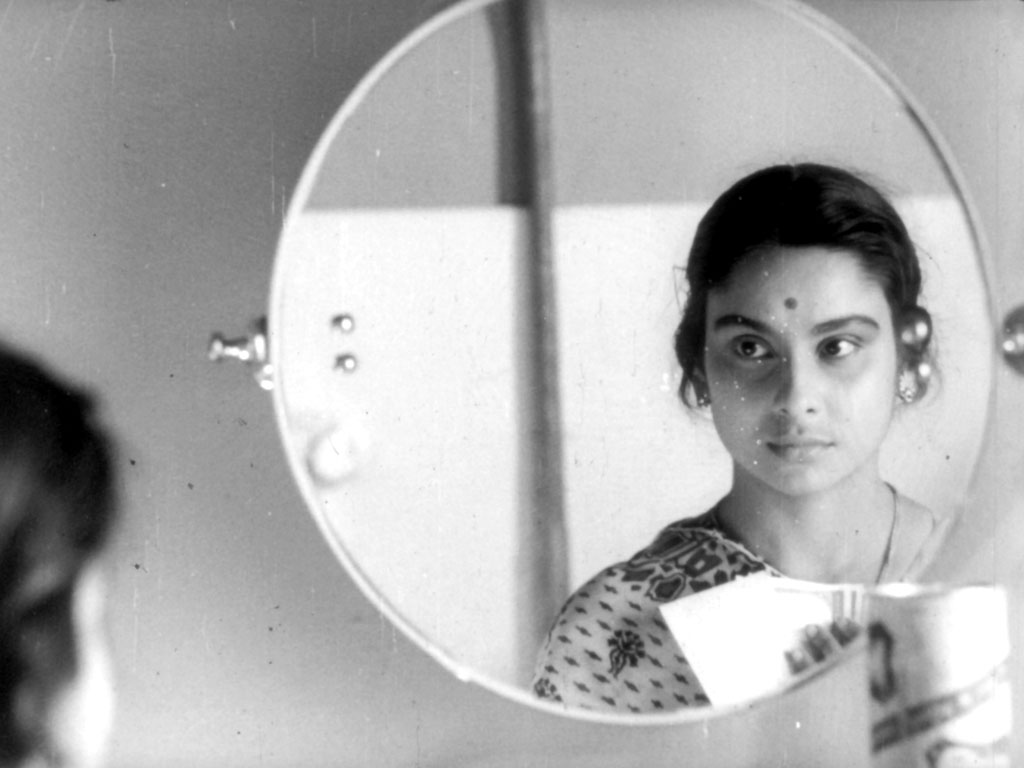Mahanagar
In Mahanagar, Satyajit Ray documents a social dilemma
Gautaman Bhaskaran, Hindustan Times Chennai, April 17, 2014
The Indian master director, Satyajit Ray’s Mahanagar (in Bengali, The Big City) – whose digitally restored version [re-]opened on April 18 2014 in eight cities – suffered political roadblocks when it was first released in 1963.
Much like Kamal Haasan’s Viswaroopam, Santosh Sivan’s Inam and most recently the Vadivelu starrer, Tenaliraman, an Anglo-Indian Member of Parliament accused Mahanagar of being prejudiced against his community.
Indira Gandhi (then heading the information and broadcasting ministry), who was asked to probe, felt that the allegation was baseless. Even then, Mahanagar suffered and missed winning India’s top film award. But – like Ray’s first work, Pather Panchali, whose honour at Cannes led to its recognition at home – Mahanagar clinched the Best Direction Prize at Berlin. And later, accolades in India.
In black and white and looking superb as if it has just popped out of the cans, Mahanagar documents with brilliant sensitivity a changing Calcutta of the mid-1950s (though Ray shot it in 1963). Based on Narendranath Mitra’s short story, Abataranika, Ray’s screenplay delves into the agony and ecstasy, the turbulence and excitement of shifting social mores seen through a lower middle class Bengali joint family. The aging, retired and virtually penniless school master and his wife live with their son, Subrata Mazumdar (Anil Chatterjee) and his wife, Arati (Madhabi Mukherjee). Jaya Bhaduri (who debuts as the teenage sister, Bani, of Subrata) along with the young couple’s little son forms part of this household.
As a lowly employee in a small bank, Subrata is perennially anxious trying to grapple with the needs of his father (who has broken his spectacles and needs a new pair if only to spend his evenings working crossword puzzles) and those of the other members of his family. There is a telling scene where Ray takes us from the old man’s lament about being unable to read to Bani who is sporting glasses! In just about this singles sequence, the movie sets the tone for clashes of varying kinds, the most important being the temptation and the reluctance in letting Arti take up a job to supplement the family income.
Although Subrata helps his intelligent and beautiful wife find employment as a sales girl in a company selling a new knitting machine (targeted at the rich), her quick economic success is resented by Subrata (we would again see such a clash of ego years later in the Jaya-Amitabh film, Abhimaan, where the singer husband’s ego gets the better of him when he finds his singer wife reaching the skies). He -- in the heart of his heart -- believes that a woman’s place is at home. He tells this to Bani, asking her what good it is for her to study when she would like her sister-in-law land in the kitchen!
However, when Subrata’s bank closes down and he loses his job, he is as wracked by guilt as he is by suspicion and jealousy – particularly when he finds a tube of lipstick in Arti’s handbag and when he sees her boss dropping her home in his car. But he cannot stop her, because of the precarious financial position at home. Mahanagar epitomises this predicament in a very simple and touching manner. No melodrama here.
Suffering through this emotional upheaval – which includes a cold war between the school-master and his son/daughter-in-law, with the old man dead against Arti going to work – is the young woman. At one end is the sheer economic compulsion and at the other, the familial objection and anger. She is not even sure that her husband wholeheartedly supports the idea of her going to work, although he had helped her get it in the first place. A point comes when pushed by home pressure, Arti is about to quit her job, when Subrata telephones her asking her to stay on, because he had just lost his.
Ray captures the essence of shifting social mores – brought on by consumerism and its effect on personal relationships -- through the dreams and desires of a family. Bani tells Arati to become a cinema star and earn pots of money, and is disappointed when the girl learns that her sister-in-law’s salary is a mere Rs. 100. The elderly teacher visits his old students, now in good positions, and bad mouths his son, hoping for sympathy and money. He longs for that day when he would earn a handsome prize that can take him and his wife to Cape Comorin.
As the bonds and ties in Mahanagar wax and wane, Ray’s classic narrates a story whose timelessness cannot be disputed at all. For it deals with the most basic of human emotions which continue to be shaken by the pulls and pressures of the community. Adding to the movie’s richness are the excellent performances by Mukherjee, Chatterjee and Bahaduri. She is just delightful as the teenager, and so in the little boy, Pintu (Prasenjit Sarkar). Madhabi disappears into Arti, as the woman tormented -- as she takes her first faltering steps outside her home and into the big city.
Mahanagar begins with the moving tram connector as the cast list rolls on, and ends with two street lamps in the foreground and the couple merging with the city’s teeming millions. Would they mingle into passive anonymity or continue fighting forces of change?
Mahanagar (The Big City)
Direction: Satyajit Ray
Cast: Anil Chatterjee, Madhabi Mukherjee, Jaya Bhaduri
Running Time: 131 minutes
Rating: *****
